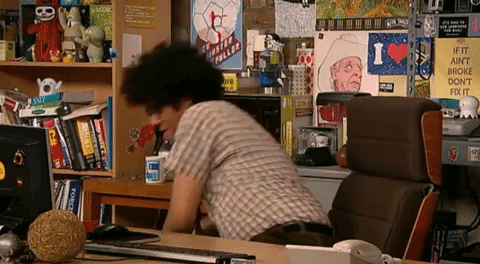Are you contemplating speaking at your first WordCamp? You should do it. One thing I hope you’ll recognize throughout this blog post is that we all have different perspectives. The different journeys we have taken provide real value for others. So, let’s stop thinking about it and take the next steps on how you’re actually going to speak at your first WordCamp.

Content
This is what is going to get you onto the WordCamp roster. Whatever your topic, I urge you to consider the audience.
Picking a Topic
First of all, do not discount beginner talks because you’ve heard them before or you think no one is interested in them. Let me tell you about WordCamp Minneapolis 2013.
As organizers, we put a beginner talk in the smallest room because we made the same assumption—that it wouldn’t be a popular talk. We were wrong. The audience was so large that people were standing in the back of the room and overflowed through the doorway into the hall. Beginner talks are often the best, as there are always newcomers, and you’ll likely bring a fresh perspective to the subject as the presenter.
Besides the skill level of your presentation, think about who it is aimed toward: business owners or users, developers or designers, sales directors or SEO experts. Broad topics can be compelling, and the ones I’ve found the most interesting ask hard-hitting questions like, “So you’ve captured thirty percent-plus of the web; now what are you going to do?”
If you can ask deep questions and make a broad topic to appeal to a wide audience, that’s great. But, don’t make your talk so broad that it is uninteresting. Remember that your talk will occur simultaneously as someone else’s talk. People will be deciding on whether to go to your presentation or the other. It’s better to capture the smaller audience that is genuinely interested.
You can accomplish this by giving a very specific talk that addresses a very specific problem. Hopefully, it’s something you’ve experienced and solved yourself. That particular thing may have not (yet) been a challenge to an attendee, but they will likely still attend your talk because they want to know how to solve complex problems and genuinely be prepared for what lies ahead in their WordPress journey.
Peer Review
A great way to get feedback before giving your presentation is to have a peer review your slides, speaking notes, outlines, and any other materials you’ve put together.
If you’re doing a presentation on security, I would consider peer review a must.
The security world is full of best practices but also littered with questionable advice and security-by-obscurity tricks that won’t fool actual hackers. We don’t want to spread any misinformation. The fact that you’ll be speaking at a conference will make you the expert in that moment; so let’s get the facts right.
Otherwise, peer review is not necessary, but still extremely helpful. If you know someone in your area that has spoken at your local WordCamp, ask them to do a peer review. More likely, they’ll be flattered, not annoyed, that you consider them the expert. Flattery is a powerful weapon.
Submission
Once you’ve got your ducks in a row, it’s time to submit your talk. If you’ve just got an idea, you can simply submit it, but with this being your first talk, I suggest you be slightly more measured and prepared. There are a lot of WordCamps out there, and they’re not going away anytime soon.
Usually, you’ll just have to provide an overview, called an abstract, as part of the speaker submission. You’ll also likely have to submit a bio. Don’t be afraid to talk up your experience! In some instances, you might be asked about your speaking history. Thankfully, you’ll be able to put your local WordPress Meetup speaking experience here (more on that in the next section), even if it’s your first WordCamp talk.
Presentation
Once your talk is accepted… and it will be accepted. Do you know why? Because you’re not going to submit it to one WordCamp and let any rejection get you down.

You’re going to submit it to several WordCamps until it gets accepted.
Delivery
Let’s try this again…
Once your talk is accepted, the presentation is where the rubber meets the road. What makes a WordCamp talk great is how it’s delivered.
- Animate your voice. Use inflection. Don’t be monotone. If you’re speaking in a monotone voice, it will sound like you don’t care about the subject. If you don’t care about the subject, why should the audience care about it?
- Don’t read directly off of the slides. The slides are there to act as a hook to capture the audience. You can (and should) use them as a reference point, the same as your audience. It should convey the main idea of what you’re currently talking about, without spelling everything out word-for-word.
One exception to the don’t-read-off-of-the-slides rule is if you’ve got a quote you really want to share. If you do this, read it with the emphasis that you would want to hear, so it makes the same impression on your audience as it initially did on you.
Practice
The best way to get comfortable with your talk is to practice it. Give the talk to a friend or your family. Give it to them especially if they don’t have first-hand knowledge with the subject. They’ll just critique you on your delivery.
Then give the talk at your local WordPress Meetup (this is what I was referring to above under Submission). There are literally hundreds of WordPress Meetups across the nation and the world. They’re hungry for new speakers like you. Once you’ve polished up your delivery with friends and family, these are the people that are going to ask the tough and interesting questions about your content. They may ask or comment on something you hadn’t thought of. Revise and incorporate that feedback into your presentation.
Just Do It!
Often the biggest hurdle to even submitting a WordCamp talk is self doubt, impostor syndrome, and fear of the unknown. I want to tell you that the reason I love the WordPress community is because it is very welcoming. While we all share the love of WordPress, we all have different experiences. Your journey brings a different perspective and a different voice. Don’t be afraid to share your story. People want to hear about it.

I wish to speak at Wordcamp a day. I hope your gudlines will boost my confidence and courage.
Thank you for sharing.
Well its like getting a boost up for Wordcamp. Its really motivational
Thanks – I’m glad you found it encouraging!
it’s very inspirational, thanks for sharing.